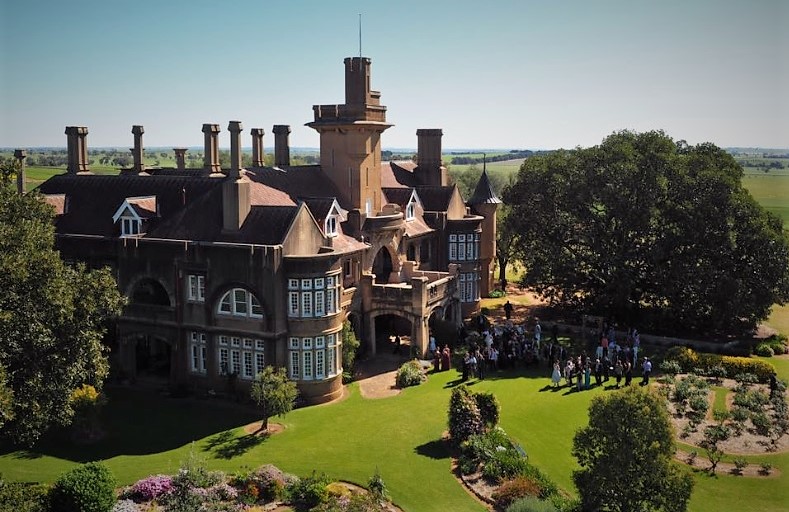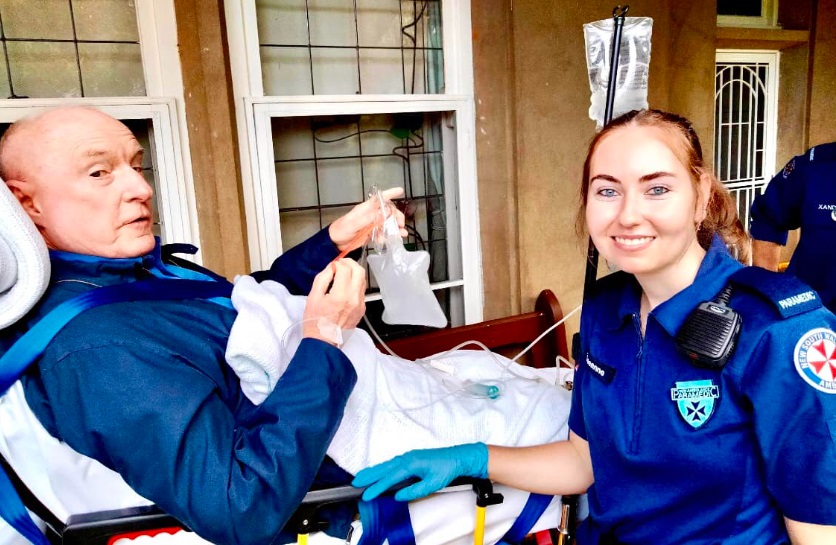
Iandra Castle, near Young, is opening its gates to the public throughout Spring. Image: Iandra Castle/Facebook.
Anyone looking to live out a fairy tale should head deep into the heart of the NSW South West Slopes in the next couple of months to visit the castle known as Iandra, near Young.
Not unlike the great castles of England, you’d travel a long way to see a building quite like it in its uncharacteristically baronial spot on a back road in the meandering South West Slopes.
Replete with its turrets, spires, high verandahs, leadlight windows, porticos, arches and lookout, the imposing two storeyed concrete Federation Romanesque-style construction boasts 54 generously timber-lined rooms which overlook the carpet of paddocks bursting with crops, sheep, cattle and pastoral scenes between it and the equally commanding Conimbla National Park, some 48 kilometres to the north away.
And now is the time as Iandra Castle, which started life as Mt Oriel Homestead, is opening its gates and doors to the public on three occasions over the next two months of Spring, with the first occurring this Sunday, September 17.
For here is a history lesson for all ages.
Today the privately-owned heritage-listed fortification barely resembles its foundational single storey structure, constructed in 1880 and named in honour of Lord Oriel of Ireland.
Nonetheless those first bricks – fired on the property that occupied most of Iandra Parish back in those days – provided a steady and enduring platform from which sprang one of the most innovative, almost bodacious rural enterprises in Australia.
Near the centre of a triangle formed by the surrounding towns of Grenfell, Cowra and Young – Iandra Castle is located near the small historic village of Greenethorpe, which can give thanks to one man for its presence.
The original holding of 32,000 acres was bought in 1878 by Irishman George Henry Greene who had previously gained pastoral experience in southern NSW on Billabong Station, in which he held a share, and later was part-owner of Tooma and Marogle stations.

Usually the scene of open days, weddings and parties, Iandra Castle was also featured on an episode of Home and Away in 2022. Image: NSW Ambulance
This block would become the largest and most progressive wheat property in Australia, where the concept of share-farming – whereby Greene supplied the land and seed and the share farmer provided the labour – was pioneered.
It was also at the forefront of wheat growing technology in Australia as Greene increased production using superphosphate fertiliser, crop rotation programs and undertook the first large scale trial site for the rustproof wheat variety Farrer.
And it was here the reaper binder and the Massey Harris reaper thresher – now known as a header – were first demonstrated.
At one time the property carried more than 19,000 sheep and in one year produced more than 10,000 tonnes of wheat with the assistance of 500-600 men, nine steam chaff cutting plants, 23 carting teams and about 700 horses permanently carried on the property.
Greene was also one of the first graziers in NSW to fully fence his property with rabbit proof netting.
In 1908, commissioning architect Edward Giles Stone, Greene commenced the conversion of this single storey brick house to a two-storey reinforced concrete building on the same foundations.
It would herald the start to a massive undertaking that also saw construction of reinforced concrete stables, a water tower with silo beneath, filtration plant, sheds, and 40 houses for the sharefarmers.
By 1911, 50 share farmers – each with around 640 acres – had been established on 18,000 acres extending across the Parish of Iandra.
Iandra had its own church, store, post office, public school, electricity-generating plant, carpenter and blacksmith shops as well as a handling agent for much farm machinery.
Three hundred and fifty men were employed on the property not including the 61 sharefarmers, the contractors or carriers.
The house provided accommodation for visitors from various parts of the world who were interested in the share-farming methods introduced in 1893 which were of benefit to all concerned, eventually allowing the share farmers to purchase their particular piece of land.
Greene was instrumental in obtaining rail transport from the Koorawatha line to Grenfell (with the rail siding of Iandra taking Greenethorpe as its new name), and also arranged the layout of the village of Greenethorpe.
After George Greene’s death in 1911, and the departure of his family to England during WWI, the property was sold to the I’Anson family until the 1950s, when it was sold to the Methodist Church, who used it as a home for delinquent boys.
Incredibly, the castle survived the rigours of time and now thrives on the remaining 1200 acres under its current custodians who use the open days to help fund restoration work.
George Greene and his wife Ellen are buried in the grounds of nearby St Saviour’s church (1886) as are the ashes of Greene’s son William (Crawford), who became a British politician and David Morris, who, after buying the property in 1975, restored it to its former glory alongside wife Margaret.
The Morris family still own the property.
Here, now, as you promenade around the grounds you will see history handsomely and meticulously preserved; a history that, beyond the many majestic walls, tells a story quite unlike that of rural Australia but represents a dedication to agriculture beyond its first exuberant flush.
Bookings for the Open Days are essential and can be made by clicking here.







